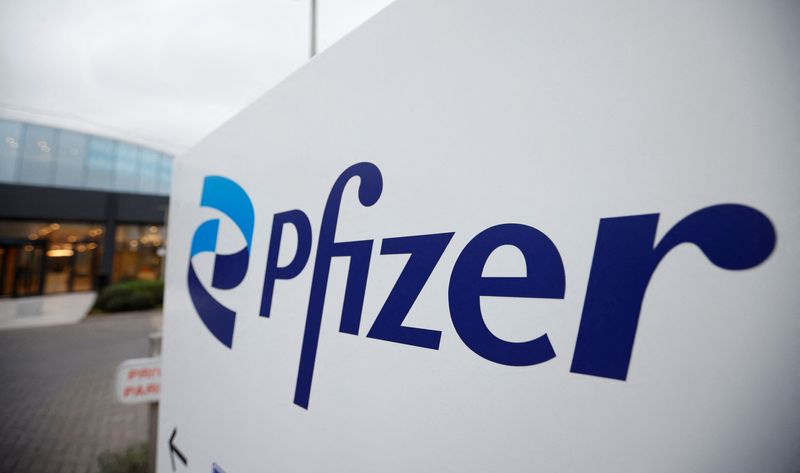By Jennifer Rigby and Maggie Fick
LONDON (Reuters) - Pfizer Inc (NYSE:PFE) has pledged to deliver critical new medicines more quickly in low-income nations, but its first such vaccine effort faces hurdles likely to delay distribution in poorer countries by several years, global health officials told Reuters.
Pfizer made a commitment on more equitable access last year, following criticism that it prioritized wealthy nations for doses of its COVID-19 shot early in the pandemic. The company says it wants to shorten a timeline in which poorer countries often get vaccines many years after they are available elsewhere.
The drugmaker received a $28 million grant from the Bill and Melinda Gates Foundation in September to support the launch of the respiratory syncytial virus vaccine in poorer countries, where RSV - a common cold-like virus - is much more likely to be lethal for very young children.
Pfizer's maternal RSV vaccine is expected to be approved for use in pregnant women in August in the United States and several months later in Europe, and the company plans to launch the product in both markets in the fall. Its peak sales forecast is of more than $2 billion annually together from the maternal vaccine and an RSV shot for older adults.
But the vaccine will need a different delivery system to be used in developing countries in Africa and Asia, including alternative packaging and syringes. Preparations for those modifications are just beginning, according to the World Health Organization and the company - which is likely to push back delivery by several years.
The case highlights how equitable global access will require better advance planning by drugmakers, governments and health organizations, health officials say.
"They could have tried sooner," said Erin Sparrow, WHO's technical officer for the RSV vaccine, referring to Pfizer. "It's a little bit disappointing, but they are doing the right thing now."
Pfizer says it is committed to a faster timeline for rolling out medicines to poor nations but acknowledges that there are challenges in meeting such goals.
"We are committed to working with the appropriate organizations, including regulatory authorities and other global health partners, to help ensure the vaccine candidate, once approved, is available in lower- and middle-income countries as quickly as possible," a Pfizer spokesperson said when asked about the timeline for the RSV shot.
In an interview last month, Pfizer's head of vaccines research and development Annaliesa Anderson said the company still aimed to make its vaccine – the first of its kind – available for pregnant women in low-income countries more or less in the "same time frame" as in wealthy countries.
It had pledged last May to offer its existing portfolio, as well as newly developed drugs and vaccines, at a not-for-profit basis to 45 lower-income countries on a faster timeline than in the past.
The company had learned during the COVID-19 pandemic that "parallel development" to meet the needs of different regions was possible, Anderson said.
LEARNING CURVE
Rates of RSV have surged since the pandemic. Inoculating pregnant women against RSV can protect babies from the virus that kills nearly 100,000 children worldwide each year.
Most of those children are under five years old, with 98% living in low and middle-income countries that have fewer healthcare resources to treat the infection.
Pfizer has yet to take a number of steps needed to make the vaccine available in developing countries, according to global health officials and the company.
They include seeking approval for the shot from the WHO, whose authorization is used by governments that don't have a strong domestic drugs regulator, and by nonprofits - such as the global vaccine alliance Gavi - that fund purchases in low-income countries.
Early discussions with the WHO are underway, but the process will be complicated because Pfizer's RSV vaccine is not designed for syringes that automatically disable after one injection, which are preferred by the health agency for safety reasons to prevent reuse.
In addition, the RSV shot is currently only available in a single-dose vial. In lower-resource settings, multi-dose vials are often used because they are cheaper and simpler to distribute.
Multi-dose vials require the addition of a preservative, which means the manufacturer needs to run new trials to ensure there is no impact on the vaccine’s safety or efficacy.
The Gates grant will be used to fund trials of a multi-dose vial, which are likely to begin next year and may take another year to complete, a source with knowledge of the plans said.
A Gates Foundation official said that the investment in the RSV program represented a learning process for the organization and the company on the steps needed for more equitable access.
They have already reached a partnership for a maternal vaccine in earlier stages of development against Group B Streptococcus, which kills around 90,000 babies a year and causes 46,000 stillbirths, over half of them in sub-Saharan Africa.
"We very much want to see that time gap [between high and low-income countries] reduced, such that there's no space between the two," said Padmini Srikantiah, lead on the RSV vaccine launch at Gates.
She still expects it to be several years before the RSV vaccine is launched in lower-income countries.
"I think we're doing better than in years before," she said. "It's a process."
(This story has been corrected to change the approval date in the US to August, not May, in paragraph 4)
